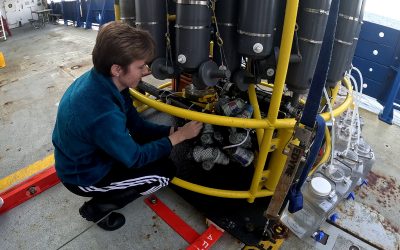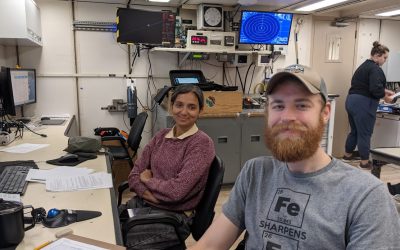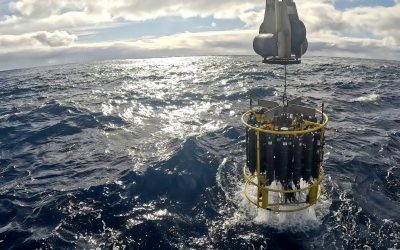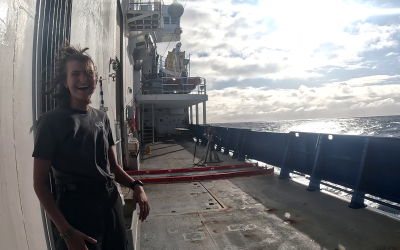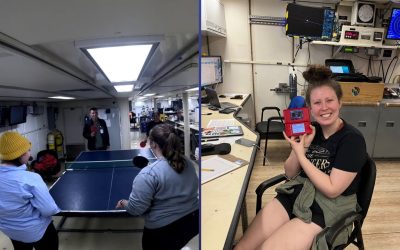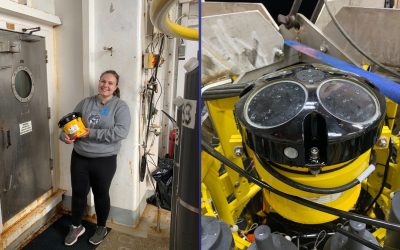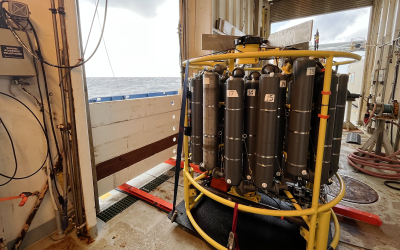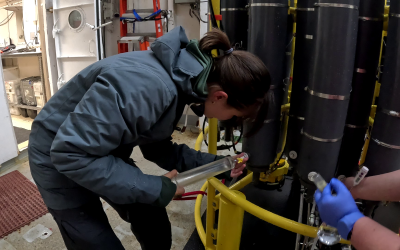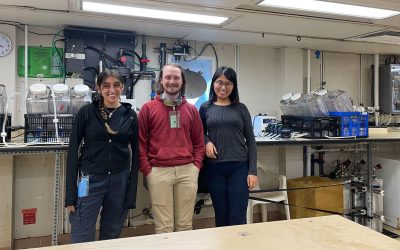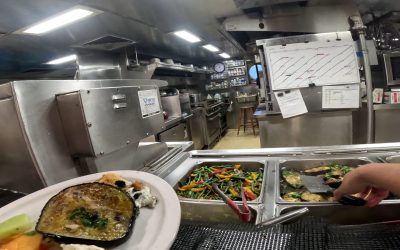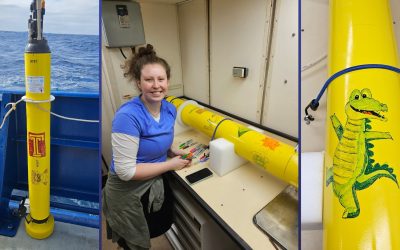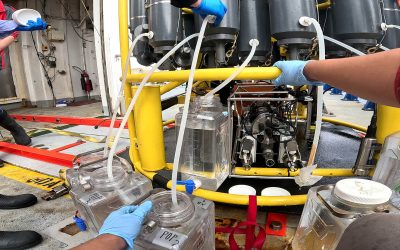2023 GO-SHIP I05
East to West along 32°S in the Indian Ocean
Our planet and oceans are both variable and rapidly changing, and the Global Ocean Ship-based Hydrographic Investigations Program (GO-SHIP) seeks to document how the Earth is changing from one decade to the next. The program makes high quality measurements of seawater chemistry, heat, and freshwater content from the ocean surface to the seafloor along specified lines that cross entire ocean basins, and seeks to repeat these measurements each decade. GO-SHIP is an international effort with contributions from many nations. The I05 (not the freeway… see the map) line crosses the Indian Ocean. It is one of the longer lines that is traditionally measured in one continuous research cruise and it has been 14 years since this line was last measured. This is one of the longest gaps for the lines traditionally measured by US teams, and this area represents a critical knowledge gap for our understanding of global and regional ocean heat, carbon, and freshwater change. The line crosses the Leeuwin Current adjacent to Australia–the only poleward flowing subtropical eastern boundary current–passes over the complex topography of the South Indian Ocean, and finishes by crossing the highly energetic Agulhas Current near South Africa.
Key and anticipated uses for these and all GO-SHIP data include:
-
- Model calibration and validation
- Carbon system studies including the inference of the anthropogenic carbon content of seawater (or how much additional carbon is in seawater due to human CO2 emissions)
- Heat and freshwater storage and flux changes Deep and shallow water mass and ventilation studies Calibration of autonomous sensors
This occupation will be the first time that metagenomic information and particulate organic carbon measurements will be made on the I05 line. This effort is through the Bio-GO-SHIP program, and these measurements will provide the foundation for future studies examining how ocean biology is shifting in response to global changes.
The specific goals of this cruise are as follows:
-
- Re-occupation of the historic stations in this line spanning from Australia to South Africa at the nominal 30 nautical mile resolution.
- As timing allows, repeat stations dedicated to obtaining higher resolution measurements while crossing important bathymetric features such as deep ocean ridges.
- A second cast dedicated to biological measurements will be collected at select stations throughout the line.
- Deployment of:
- 7 EM Apex (“SQUID” floats, Sampling QUantitative Internal-wave Distribution) that measure, temperature, salinity, velocity, ocean turbulence, and diffusivity
- 8 floats (through the SOCCOM and GO-BGC programs) that measure biogeochemical properties in addition to measuring the temperature and salinity of seawater
- 12 Directional Wave Spectra Barometric Drifters from the Indian National Centre for Ocean Information Services (INCOIS) and
- 10 drifters from NOAA’s AOML laboratory.
GO-SHIP I05 will depart Fremantle, Australia on the R/V Roger Revelle on July 22, 2023 and arrive in Cape Town, South Africa on September 14, 2023.
Please join along on the journey by following the expedition blog!
Chief Scientist: Brendan Carter (UW)
Co-chief Scientist: Kay McMonigal (UAF)
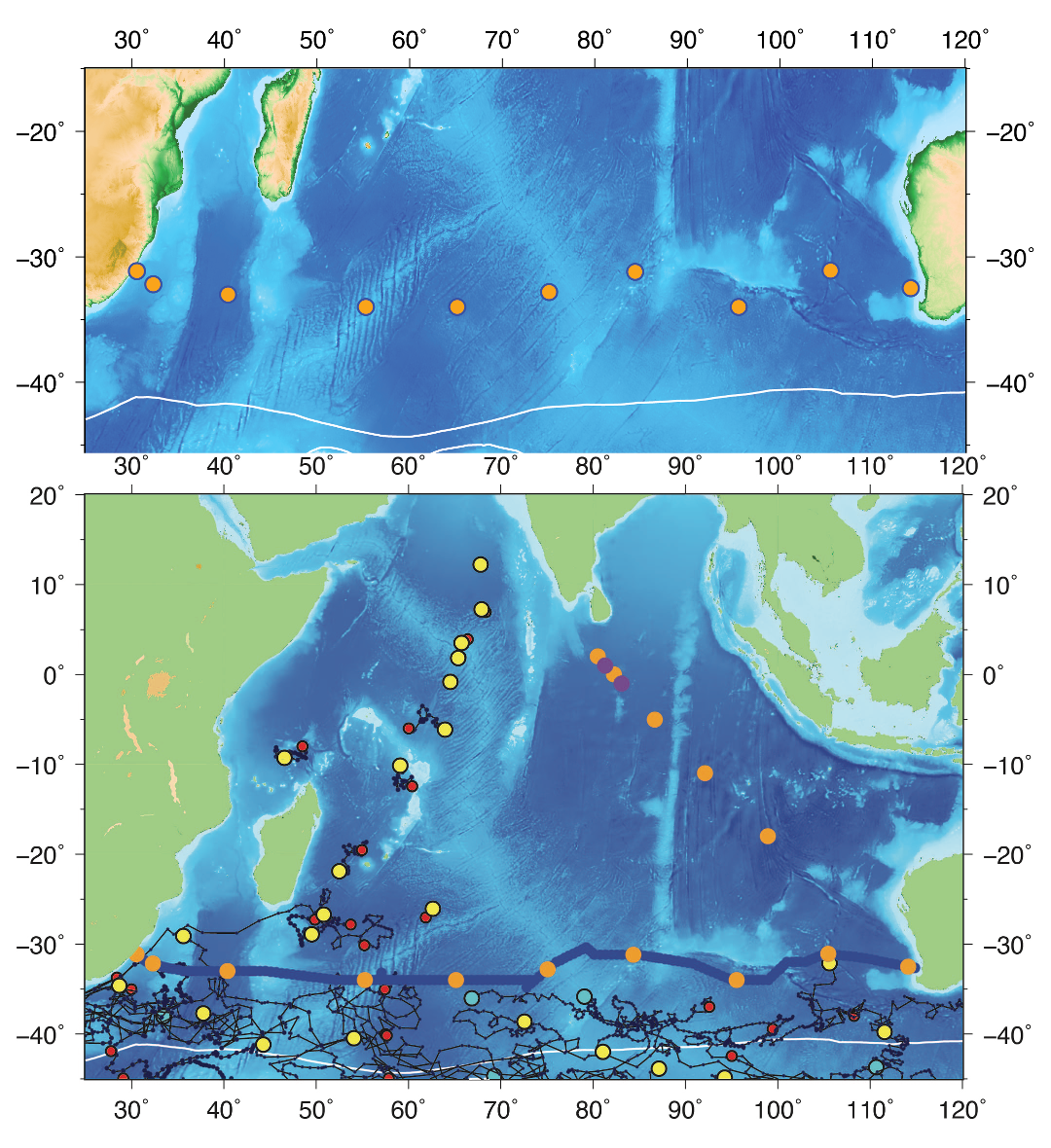
Figure 1: Plot of cruise track. GO-SHIP I05 will depart Fremantle, Australia on the R/V Roger Revelle on July 22, 2023 and arrive in Cape Town, South Africa on September 14, 2023. The upper image shows just the cruise track for the I05 expedition. The lower image shows the cruise track relative to previous float deployements in the region.
2023 GO-SHIP IO5 Indian Ocean Expedition Logs
Cups
One fun activity for deep CTD casts is to shrink styrofoam cupsI05 Log: Cups Under Pressure One fun activity for deep CTD casts is to shrink styrofoam cups. The cups have air in them, which is forced out as the cups are taken to higher and higher pressures. Our...
Time on Board
Time’s passage is different aboard a research cruiseI05 Log: Time Aboard the Roger Revelle One of the fundamentals of special relativity is (in simplest terms) that time passes differently as an object’s velocity approaches the speed of light. I would like to humbly...
CTD Casting
Describing one cycle of CTD castingCTD Watch-standers Log: CTD Casting In one cycle of CTD casting, we start with a process called “cocking” where we need to manually pull out the top and bottom caps of the Niskin bottles (Rosette bottles) and hook them to the hinges...
Two Weeks Out
Time certainly moves differently out here in the Indian Ocean.CTD Watch-standers Log: August 5 As of 0600 today, we have been at sea for exactly two weeks. Time certainly moves differently out here in the Indian Ocean. In fact, we just crossed another 15...
Free Time
Finding ways to occupy yourself on a long cruiseI05 Log: Free time on a 55-day cruise Have you ever gone on a long flight or bus ride, so you download some movies or bring along some books? But of course, when you get on your bus or plane, you no longer have any...
Sound Studies
Measuring ocean currents with sound using the Acoustic Doppler Current Profiler (ADCP)I05 Log: Studying the Ocean with Sound The Acoustic Doppler Current Profiler, or ADCP, is an instrument that uses sound to measure the currents within the ocean. It does this by...
I05 Week 2
Sampling and life at sea in rougher weather Us: “Deck, lab. Ready to power on the Log.” “Lab, Deck. You may power on the Log.” Us: “Lab, copy.” On our 11th day aboard the R/V Roger Revelle we started our first day of what will be a full month at sea… so happy August....
Life at Sea
What is life at sea like?CTD Watch-standers Log: July 25 The RV Roger Revelle departed Fremantle, Australia on July 22 at 0600 as part of the GO-SHIP program. It is only day 4 of our research and already, this has been the most exciting and eventful experience of my...
Bio GO-SHIP
Studying the variability in particulate organic matter (POM) with changing oceans due to climate change.I05 Log: Bio GO-SHIP The Bio GO-SHIP initiative sheds light on the variability in particulate organic matter (POM) with changing oceans due to climate change....
Eating Well
Yummy eats aboard the R/V Roger RevelleCTD Watch-standers Log: Eating Well As we enter the third week of our voyage across the Indian Ocean, I’d like to share the yummy eats aboard the R/V Roger Revelle. Amidst the dedicated efforts of the scientists and crew, the...
Launching Floats
The GO-SHIP IO5 expedition launched one GO-BGC and two SOCCOM floatsGO-SHIP I05: Launching Three Adopted Floats The Adopt-A-Float program is run by GO-BGC but includes floats from the SOCCOM project as well. You can find out more about how to adopt-a-float here. The...
I05-Week 1
Working together to collect data in the South Indian Ocean along the I05 transect Us: “Deck, lab. Ready to power on the Log.” “Lab, Deck. You may power on the Log.” Us: “Lab, copy.” All aboard the R/V Roger Revelle, for the next 7 weeks scientists and crew members...

